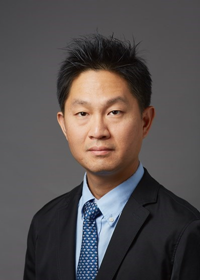
2. Dissect graft-versus-host disease and graft-versus-leukemia in allogeneic stem cell transplantation (allo-SCT) by manipulating co-inhibitory molecules
3. Human correlative studies in line with clinical trials
Kim TK, et al. Long-term follow-up of a single institution pilot study of sirolimus, tacrolimus, and short course methotrexate for graft versus host disease prophylaxis in mismatched unrelated donor allogeneic stem cell transplantation. Ann Hematol. 2019 Jan; 98(1): 237-40.
Kim TK, Chen L, Herbst RS. Opinion Article. Trends Immunol. 2018 Aug; 39(8): 624-31.
Li AW, Yin ES, Stahl M, Kim TK, Panse G, Zeidan AM, Levanthal JS. The skin as a window to the blood: Cutaneous manifestations of myeloid malignancies. Blood Rev. 2017 Nov; 31(6): 370-88.
Kim TK, et al. Single agent blinatumumab as frontline therapy for an 85-year-old patient with B cell precursor acute lymphoblastic leukemia. Ann Hematol. 2016 Oct; 52(3): 172-83.
Kim TK, Gore SD, Zeidan AM. Epigenetic Therapy in Acute Myeloid Leukemia: Current and Future Directions. Semin Hematol. 2015 Jul; 52(3): 172-83.
Shindo T, Kim TK, Benjamin CL, Wieder ED, Levy RB, Komanduri KV. MEK inhibitors selectively suppress alloreactivity and graft-versus-host disease in a memory stage-dependent manner. Blood. 2013 Jun 6/6/2013; 121(23): 4617-26. PMID: 23575444, PMCID: PMC3674663, PII: blood-2012-12-476218, DOI: 10.1182/blood-2012-12-476218, ISSN: 1528-0020.
Bayraktar UD, Kim TK, Drews-Elger K, Benjamin C, El-Ashry D, Wieder E, Komanduri KV. Simultaneous measurement of ERa, HER2, and phosphoERK1/2 in breast cancer cell lines by flow cytometry. Breast Cancer Res. Treat [print-electronic]. 2011 Sep; 129(2): 623-8. PMID: 21607585, DOI: 10.1007/s10549-011-1586-z, ISSN: 1573-7217.
Kim TK, Billard MJ, Wieder ED, McIntyre BW, Komanduri KV. Co-engagement of alpha(4)beta(1) integrin (VLA-4) and CD4 or CD8 is necessary to induce maximal Erk1/2 phosphorylation and cytokine production in human T cells. Hum. Immunol. 2010 Jan; 71(1): 23-8. PMID: 19815047, PMCID: PMC2795106, PII: S0198-8859(09)00595-3, DOI: 10.1016/j.humimm.2009.09.360, ISSN: 1879-1166.
Kim TK, St John LS, Wieder ED, Khalili J, Ma Q, Komanduri KV. Human late memory CD8+ T cells have a distinct cytokine signature characterized by CC chemokine production without IL-2 production. J. Immunol. 2009 Nov 11/15/2009; 183(10): 6167-74. PMID: 19841187, PII: jimmunol.0902068, DOI: 10.4049/jimmunol.0902068, ISSN: 1550-6606.
The Kim lab (KIM LAB AT VUMC-HEM/ONC) is in the division of Hematology/Oncology, the department of Medicine at Vanderbilt University Medical Center. The Kim lab is also affiliated with Vanderbilt Center for Immunobiology (VCI) and Vanderbilt Institute for Infection, Immunology and Inflammation (VI4). Dr. Kim (PI) is a physician who treats leukemia/lymphoma/myeloma patients using chemotherapy and stem cell transplantation. Dr. Kim is also an immunologist who is interested in tumor immunology and transplant immunology. He received a research training in Lieping Chen lab at Yale University. We are looking for enthusiastic students and post-doctoral fellows.
The major focus of the laboratory includes
1. Overcoming immune evasion in leukemia: Recently, immune checkpoint blockades, including anti-programmed cell death protein 1 (PD-1) therapy, have shown unprecedented clinical efficacy in some solid tumors. However, the response rate to immune checkpoint blockades in myeloid leukemia has been disappointing. The failure of anti-PD-1 therapy in myeloid leukemia suggests that immune evasion in A myeloid leukemia may be attributed to the expression of unique co-inhibitory molecules outside the PD-1–PD ligand 1 (PD-L1) axis. We are investigating to find novel relevant co-inhibitory molecules besides PD-1¬–PD-L1 in human myeloid leukemia and study the role of those co-inhibitory molecules in mouse models including humanized mice.
2. Dissect graft-versus-host disease and graft-versus-leukemia in allogeneic stem cell transplantation (allo-SCT) by manipulating co-inhibitory molecules: Allo-SCT represented the earliest successful immunotherapeutic strategy in AML, employing graft-versus-leukemia (GVL; the attack of donor-derived T cells on leukemic cells). But GVL treatment is generally accompanied by the increased risk of graft-versus-host disease (GVHD; the attack of healthy recipient tissues by donor T cells), as both GVL and GVHD are caused by similar allogeneic T cell responses. In addition, our current immunosuppressive strategies (e.g., corticosteroids) are indiscriminate, so we cannot selectively inhibit GVHD while maintaining GVL effects. Non-selective pharmacologic inhibition can increase the risk of opportunistic infections due to delayed immune reconstitution and may mitigate GVL effects. To overcome this issue, selective inhibition of allo-reactive T cells to suppress GVHD while maintaining GVL and pathogen-specific immunity has been investigated. We are investigating strategies to selectively inhibit GVHD with sparing GVL in allo-SCT by manipulating co-inhibitory molecules.
3. Human correlative studies in line with clinical trials: we participate in human correlative studies with samples from patients in clinical trials. Typically we perform a CyTOF, a multi-color flow cytometry, a multiplex immunofluorescence, ex vivo T cell suppression/activation assay.
